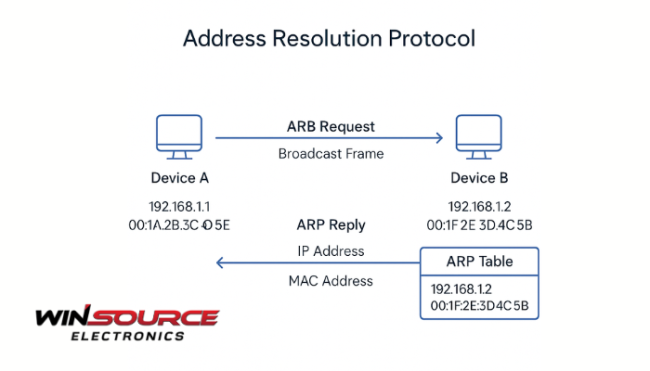
* Question
What is the ARP protocol?
* Answer
The ARP (Address Resolution Protocol) is a fundamental network protocol used in IPv4 networks to map IP addresses to their corresponding MAC (Media Access Control) addresses. It operates at the link layer (Layer 2) of the OSI model, enabling communication between devices on the same local network (LAN).
How ARP Works
When a device wants to communicate with another device on the same network:
- It checks its ARP cacheto see if it already knows the MAC address for the target IP.
- If not, it sends a broadcast ARP request— a packet asking “Who has IP address X.X.X.X?”
- The device with that IP responds with an ARP reply, providing its MAC address.
- The sender updates its ARP cache and uses the MAC address to send data directly.
Example
Suppose computer A (IP: 192.168.1.10) wants to send data to computer B (IP: 192.168.1.20):
- A broadcasts: “Who has 192.168.1.20?”
- B replies: “192.168.1.20 is at 00:1B:44:11:3A:B7.”
- A records that mapping and communicates directly using that MAC address.
Types of ARP
- Request:Sent by a device to ask for the MAC address of an IP.
- Reply:Sent in response to a request.
- Gratuitous ARP:Sent by a device to announce or update its own IP–MAC mapping (often used to detect conflicts or update switches).
- Proxy ARP:When one device answers ARP requests on behalf of another device (used in routing scenarios).
Security Considerations
ARP lacks authentication, so it’s vulnerable to ARP spoofing or poisoning, where attackers send false ARP replies to redirect traffic (e.g., man-in-the-middle attacks).
In Summary
Feature | Description |
Full Name | Address Resolution Protocol |
OSI Layer | Layer 2 (Data Link) |
Purpose | Maps IP addresses to MAC addresses |
Key Operations | ARP Request and ARP Reply |
Common Attack | ARP Spoofing / ARP Poisoning |

COMMENTS